- Home
- Eric Nylund
Halo: Evolutions - Essential Tales of the Halo Universe Page 12
Halo: Evolutions - Essential Tales of the Halo Universe Read online
Page 12
A Pelican appeared, flaring out to land in the clearing at the top of the mountain. Snow swirled out from under the backwash of its engines, and a craggy-faced gunnery sergeant stepped out, as well as a number of corporals.
He didn’t even look at us. “Get everyone up, now!” he ordered the corporals.
They were off, tapping armor with electronic wands to unfreeze it.
Something wasn’t right. There was a strangeness to the hurry they did it with. And what the hell was a gunnery sergeant doing talking to us in the middle of a training session?
We all gathered around the gunny, lining up as we’d been trained. He nodded. “Is this everyone?”
A quick head count confirmed that this was everyone.
“Good. At ease. You’ve all been out here in the wilderness training hard, but I’ve been sent to let you know your training is going to be accelerated.”
The instructors frowned, and we all shifted.
“Much of this information has been classified, and between the ONI and the Navy types, this is what we can tell you: We have made first contact with an intelligent alien civilization.”
A gasp rose at hearing those words. Some of us reflexively looked up into the sky. First contact!
The gunnery sergeant continued, cool as ice. “We know that standard protocols were followed. And that things didn’t go well. Our ships were attacked by alien beings referred to as the Covenant. Before destroying our ships they claimed our destruction was the will of their gods, and that they were the instrument. It seems to be an act of war. As of today the UNSC is on full alert. The Colonial Military has been officially disbanded, all remaining units are officially being pulled in and reassigned and retrained. And we’re ramping up training here, because we have a feeling we’re going to need all the recruits we can get.
“These aliens are for real. They’ve already taken, or possibly destroyed, one Outer Colony. Admiral Preston Cole is being tasked with creating a force to get it back.”
We were stunned.
Private Rodriquez from Madrigal was the one who asked, “What colony fell to them, sir?”
“Harvest,” the gunnery sergeant said, and my knees buckled.
Someone grabbed my shoulder. I staggered around and found Felicia sitting in the mud. She looked up at me, tears in her eyes. “Dirt?” she asked. “Do you still think that now?”
I didn’t have anything to say back. I stood in front of her, struck mute.
Harvest was gone.
I’d tried to find the last nice thing I said to my dad before I’d left; the last time we laughed, smiled even? I couldn’t find one.
I’d always figured he’d keep on farming. That maybe I’d go back, one day, when I’d traveled worlds and seen so much, and maybe talk to him again. Maybe.
But there were no maybes now. He was gone now.
Harvest was gone.
Felicia grabbed a fistful of mud and leaped up at me. “Dirt! I have your dirt, you son of a bitch!”
She hit me, mud from her clenched first spattering my face, but I didn’t feel it. I felt like a part of my soul had been ripped away, and even after she was pulled off me, I just stood there, numb.
Dirt.
Just dirt.
FOR THE rest of training they moved Felicia to another fireteam. Our new team leader, Rahud, took his annoyance about the swap out on me. He was an experienced UNSC veteran who’d joined the ODSTs after years of service.
He didn’t take too kindly to the fact that just because I’d been given rank in the old Colonial Military, it had given me the ability to apply to the ODST program. He certainly didn’t like the fact that some falling out between two backwater planet recruits like Felicia and me had caused him to get moved away from the team he’d trained with.
Any screwup, the slightest mistake, and he was in my face, calling me a detriment to the team and a liability.
But it didn’t faze me. My bonds with Kiko and Mason were tight, and the three of us held our own.
Every day, as the months of training passed, there was some new rumor floating around about the aliens. Ships they’d attacked. Their invincibility.
A lot of it was bull. Back then we didn’t know anything.
We certainly didn’t realize what we were up against. Kiko and Mason would joke about getting out there to kick alien ass, and with a few beers in me, I’d join them.
Certainly after ODST training, we figured a bunch of religious fanatic aliens would be no match for the atmosphere-jumping, hard-as-nails brutality that a raw ODST-trained human could bring to the table.
But when the first leaked photos of the Outer Colonies attacks came out, I wondered if we might be wrong. Some of them had been turned into glass balls by Covenant energy weapons.
What the hell were we going to be able to do against that kind of firepower?
YOU KNOW that sound inside a single-occupant exoatmospheric insertion vehicle? That combination of a howling wind, a dull roar, and the crackle and creak of the SOEIV’s skin flexing and burning. No matter how many times I jumped, hearing it always scared the crap out of me.
Feet First into Hell. That was the ODST motto. Feet first with a two-thousand-degree fireball burning around the pod as it flames its way down through the atmosphere.
It’s a hot ride.
A bumpy ride.
And not everyone survives it.
My first combat SOEIV insertion had me coming in hot with a hundred other ODSTs over the main continent of Hat Yai, three years after I finished training. We’d been mainly stuck in naval battles, waiting in our bays, just itching for a chance to be thrown against this new enemy. Everyone was pumped about Admiral Cole’s triumphant recapture of Harvest earlier that year.
What isn’t, perhaps, often recounted, but is a fact that quickly became well-known amongst the rank and file, was that Cole lost three ships for every one Covenant ship destroyed.
It was a Pyrrhic victory that left Cole’s fleet severely damaged.
Now Cole had been jumping his fleet around from engagement to engagement throughout the Outer Colonies, wherever the Covenant showed up.
So far, there’d been no repeat of the retaking of Harvest. Outer Colonies had been glassed or taken. World by world, we were falling back.
Covenant ships in low orbit picked off ten of us, and when landing ate another pair of SOEIVs that failed and cratered into the lush rain forest of our landing zone.
It took half an hour for Rahud to get us grouped up; our pods had dodged enough fire that we’d gotten fairly well separated.
“Where’s the rest of the squad?” Mason asked.
Rahud shrugged. “I can’t raise them. Assume the worst.”
We trudged through thick mud and rain forest, vines and creepers holding us back as we got bogged down farther and farther in.
“There’s no way a Pelican’s coming in through that kind of foliage,” Kiko commented. “How do we get out?”
Rahud ignored us. “Covenant forces established a base of some sort up ahead. We’re all converging on it.” This is why we’d been sent down: an exploratory and reconnoitering force.
Mason leaned in. “That’s if our ship can even get back to drop in recovery vehicles.”
The destroyer Clearidas had dropped us in, ducking and weaving in between Covenant forces in low orbit, bouncing itself off the upper atmosphere as it vomited its cargo of a hundred SOEIVs.
As I ran through tropical jungle, sweating under my black ODST armor, I wondered if there were enough ships high overhead to hold off the Covenant.
“Hold,” Rahud hissed. We were getting close.
Other ODSTs materialized out of the forest. Hand signals were exchanged, and information rippled throughout the forest.
Ten ODST squads grouped up and began to ooze through the brush, weapons at the ready.
Rahud led us carefully down the lip of a dirt road that had been hastily carved into what was fast becoming rock.
We paused at the li
p of a giant sinkhole.
“Holy . . . ,” someone began.
In just days the aliens had excavated a massive pit that bored deep into the ground. Bluish-gray metal spars soared up from the bottom into the air from what looked like a freakish cross between a city and a hive at the bottom, including bubblelike structures that studded the sidewalls of the giant pit.
“They’re building a small city down there,” Mason said. “Now that they’ve cleaned out the colonists.”
“They’re Grunts,” a private suggested. “Those big buildings are methane tanks.”
“Methane?” someone else asked.
“Didn’t you listen to the damn briefings . . .”
“Movement!” Kiko pointed, and Rahud turned.
I saw my first Covenant aliens standing on the other side of the lip: Ten Grunts and a pair of Jackals were staring right back at us.
The Jackals stood tall, with weird back-jointed legs, and had Mohawk-like feathers and birdlike faces.
The dwarfish Grunts—with their doglike faces behind breathing equipment, squat legs, and weird triangular methane tanks—started shooting at us.
Balls of plasma energy sizzled and spat as they hit the trees behind us.
As the closest team, we fanned out, falling into our usual routines. Kiko and Mason laid down cover fire, and Rahud and I skirted the lip clockwise toward the aliens.
ODST snipers hit the Grunts, splashes of blue blood blossoming in the air as the aliens dropped to the ground. The Jackals held up energy shields attached to their forearms to ward off the gunfire, and returned it tenfold.
We sprinted around the rim. “Their feet!” Rahud shouted.
The shields didn’t cover their feet. I aimed low, chewing up mud and vines, walking the shots along until I hit my first Jackal.
It screeched and pitched forward, shield bobbling, and Rahud shot it in the head. Purple blood oozed down the side of the corpse.
The other Jackal turned to face us, opening itself up for a sniper shot by an ODST. It grabbed its chest, moaning, and then stumbled off the edge of the lip and fell down. It bounced off one of the struts, then continued all the way down to the ground of the pit below.
I pushed the dead Jackal’s body with a boot. Here was the enemy. Flesh and blood. Killable.
Now that we had the lip surrounded a command hierarchy had been established. Major Sedavian had landed at the very rear of the group, and had finally caught up to us.
“Figure we’re going down there?” Mason asked, peering over the edge. We could see more Covenant at the bottom, with hundreds of Grunts and a handful of Jackals that seemed to be overseeing them. They were mustering near elevators, getting ready to come up to join the fight. An energy bolt sizzled and blew up a piece of rock near my face, and I ducked back to the safety of cover.
“Negative,” Rahud said, coming up from behind us suddenly. “Covenant Cruisers just arrived. We’re outgunned. We’re getting out of here and dropping a Shiva into this mess.”
That was it. The fight was over, we’d already lost.
I could sense the frustration in the air as word spread. But orders were orders.
The Pelicans could barely land on the lip, and the Covenant at the bottom of the pit opened antiaircraft fire, but we all bugged out easily enough.
As we headed for orbit, the Shiva nuclear warheads left on the lip detonated.
Once we were aboard, the Clearidas entered slipspace, leaving the system.
Another retreat.
___________
THAT WAS the pattern for the next few years. The Covenant ate us up, system by system, with very few victories on our side.
Most of the worlds I’d come to know well were all destroyed. No one cared about Insurrectionists, Outer Colonies versus the UNSC, or the Colonial Military ten years after Harvest fell.
There was only humanity versus the Covenant.
I saw more than my fair share of dead aliens and dead comrades.
Eventually I stopped making friends.
Mason died in my arms on Asmara after one of the snake-headed Covenant Elites speared him along with ten other ODSTs with his energy sword before I got off a near point-blank shot with a missile launcher.
I found Mason lying among the debris; I could smell his seared flesh.
He looked up at me with glassy eyes and asked for his mother, then coughed up blood and just . . . stopped being.
Kiko was stabbed in the face by the apelike Brutes on another world, the name of which I’ve since forgotten. Large, muscular, hairy aliens, they could snap a neck with their bare hands. Rahud died from energy artillery.
I was promoted to team leader, then a squad leader. I had long since stopped learning names; I didn’t want to form any attachments.
Maybe that’s why I never rose above squad leader.
I had become a shadow of myself. A robot. Hitting my mark and killing the enemy, and waiting for the one day a stray flash of energy would kill me.
I was waiting for the day I could be buried. In the dirt.
The steady stream of defeats led to the creation of the Cole Protocol. No ship was to return directly to any of our worlds, particularly Earth, but instead execute random jumps in slip-space to throw off any potential Covenant shadowers.
“Where was that order for all the glassed Outer Colonies!” I’d shouted, standing up in the middle of a mess hall.
I remember once I woke from the bitter cold of cryogenic storage, staggering around and vomiting suspension fluid, and realized something was really, really wrong. This wasn’t the usual slow routine of getting unfrozen and waking up fully as we were briefed for our next assignment. This time emergency lighting kept everything shadowy in the dim red. Everyone on deck hurried around nervously, and I could hear the unmistakable sound of the ship’s MAC gun firing.
“We’ve been ambushed by a Covenant cruiser. You’ve all been flash unfrozen,” the officer on deck said. “Just in case.”
Keeping us on ice let us all go through the long slipspace routes without eating up supplies and sucking down oxygen. Or getting bored out of our minds.
Flash unfreezing was dangerous, and only for emergencies. I think the ship’s captain was worried about being boarded. Either way, someone up the chain had given the order for the risky decanting, maybe out of panic. A third of the unfrozen ODSTs on deck died.
Clearidas managed to escape. But my men didn’t.
A waste.
AFTER ALL these years of combat, I slowly began to feel myself peeling apart. But I had no home, nowhere I really wanted to be, no one to see.
So I soldiered on, battle after battle.
I almost saw my end in a hastily dug out trench on Skopje, an Inner Colony world. Unlike most of the wilder Outer Colonies, this world had highly built up urban areas, roads, and railways. It was an entire civilization sprawled across its island continents.
From the trench, if I turned to look behind me, I could see a skyline glinting and blazing in the sun over a red marbled museum. But back in front: mud.
We were sent in to protect the headquarters of a shipbuilding corporation during the evacuation of their shipyards. The machines, tools, and personnel that could be saved would be relocated to Reach, to continue building parts for the war effort.
Our headquarters were the halls of a nearby city museum, the grounds of which served as our landing zone and held all the quickly placed antiaircraft batteries.
“This is the fallback point, there is nowhere else to go,” we were told. “So you hold the perimeter at all costs.”
Covenant air support dared not attack us directly, not for several blocks. So they threw Grunts at us. Thousands of them in brutal house-to-house warfare, their numbers overwhelming our loose perimeter. We fell back and regrouped, drawing them in until we were foxholed on the edges of the vast museum gardens. We let the Grunts charge us across the muddy field.
They’d pushed us back, but we still simply thought of them as cannon fodder
, waiting until they got close enough to hit their methane tanks and watch them explode. Now that we had our open ground and dug in positions, we slaughtered them.
But they kept coming. And after waves of screaming Grunts came the races higher up in the Covenant food chain: Jackal snipers, Brutes rushing the line, and then finally Elites, flashing their energy swords as they got in close enough to the melee.
The trenches got cut off, communication lost, and I found myself crouched in between two walls of mud with another ODST, waiting for the Covenant to leap in with us.
This would be it. We’d go down fighting in the mud, I thought.
But instead, in an explosion of mud, a two-ton powered suit of gray-green armor landed between us. “Follow me!” the powerful baritone voice behind the gold visor ordered.
Then it leaped over the edge into the fray, plasma discharges slapping the powered armor.
We followed.
The armored human was like a tank, clearing the way for us. It shrugged off Grunts like they were annoying mosquitoes, tackled Brutes face on, and was an equal match for any Elite.
We were led to a giant castle, like something out of a picture book, with large antiaircraft guns mounted along the walls and AIE-486H heavy machine guns on the parapets pointed down.
Inside we were left by the giant armored man.
“What the hell was that?” I asked the Marine in the courtyard.
“Special ONI project. They call them Spartans. Engineered to be the best, armored with the best. Haven’t you heard the ONI announcements? They’ll be ending the war with these sons of bitches running through the Covenant soon enough!”
The ODSTs weren’t the cutting edge hard-asses anymore.
I’d just seen the future of warfare. I wasn’t in it.
I didn’t have time to dwell on this, because suddenly an all-too-familiar voice said, “Gage? Gage Yevgenny? Is that really you?”
And I turned to see Felicia standing with a BR55 slung under one arm and a canteen in the other.
“Felicia?” There were wrinkles in her tanned, leathery face. But all these years would do that. We’d just been kids the last time we saw each other, really.

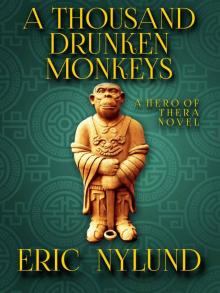 A Thousand Drunken Monkeys: Book 2 in the Hero of Thera series
A Thousand Drunken Monkeys: Book 2 in the Hero of Thera series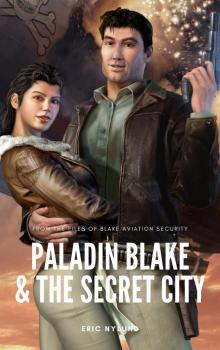 Paladin Blake & The Secret City
Paladin Blake & The Secret City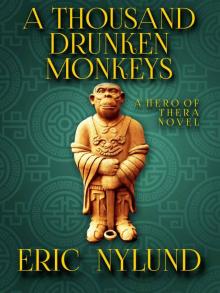 A Thousand Drunken Monkeys
A Thousand Drunken Monkeys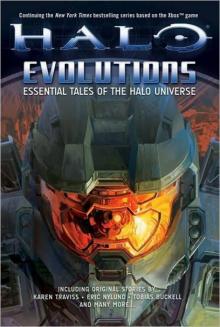 Halo: Evolutions - Essential Tales of the Halo Universe
Halo: Evolutions - Essential Tales of the Halo Universe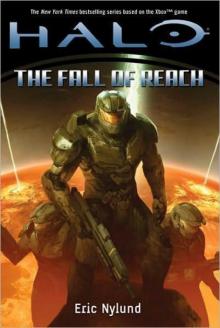 Halo: The Fall of Reach
Halo: The Fall of Reach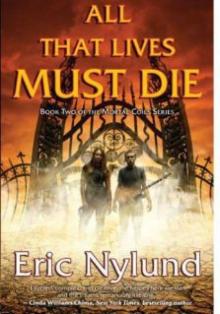 All That Lives Must Die mc-2
All That Lives Must Die mc-2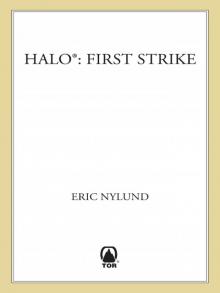 First Strike
First Strike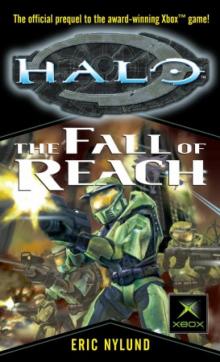 The Fall of Reach h-1
The Fall of Reach h-1